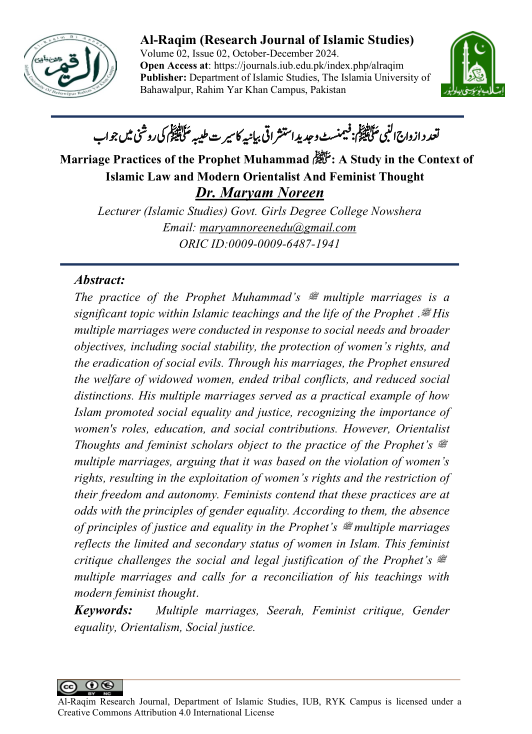تعدد ازواج النبیﷺ: فیمنسٹ و جدیداستشراقی بیانیہ کا سیرت طیبہﷺ کی روشنی میں جواب
Marriage Practices of the Prophet Muhammad ﷺ: A Study in the Context of Islamic Law and Modern Orientalist And Feminist Thought
Keywords:
Multiple marriages, Seerah, Feminist critique, Gender equality, Orientalism, Social justiceAbstract
The practice of the Prophet Muhammad’s ﷺ multiple marriages is a significant topic within Islamic teachings and the life of the Prophet ﷺ. His multiple marriages were conducted in response to social needs and broader objectives, including social stability, the protection of women’s rights, and the eradication of social evils. Through his marriages, the Prophet ensured the welfare of widowed women, ended tribal conflicts, and reduced social distinctions. His multiple marriages served as a practical example of how Islam promoted social equality and justice, recognizing the importance of women's roles, education, and social contributions. However, Orientalist Thoughts and feminist scholars object to the practice of the Prophet’s ﷺ multiple marriages, arguing that it was based on the violation of women’s rights, resulting in the exploitation of women’s rights and the restriction of their freedom and autonomy. Feminists contend that these practices are at odds with the principles of gender equality. According to them, the absence of principles of justice and equality in the Prophet’s ﷺ multiple marriages reflects the limited and secondary status of women in Islam. This feminist critique challenges the social and legal justification of the Prophet’s ﷺ multiple marriages and calls for a reconciliation of his teachings with modern feminist thought.
References

Downloads
Published
Issue
Section
License
Copyright (c) 2024 Dr. Maryam Noreen

This work is licensed under a Creative Commons Attribution-NonCommercial 4.0 International License.




